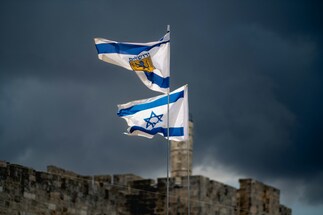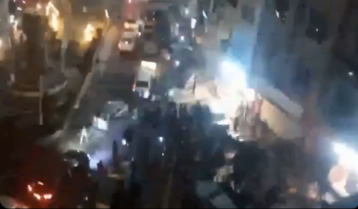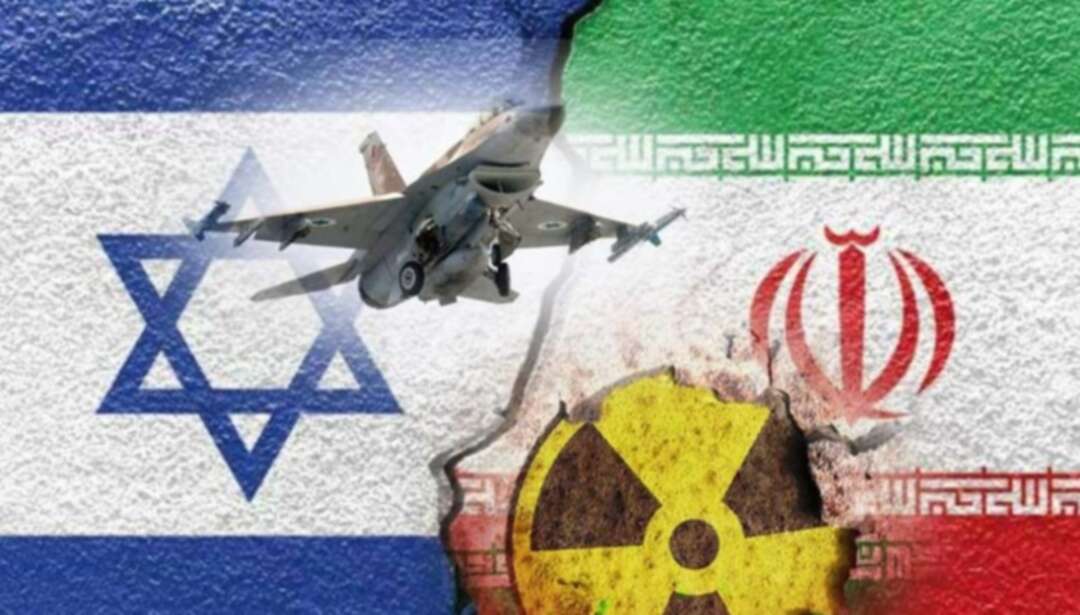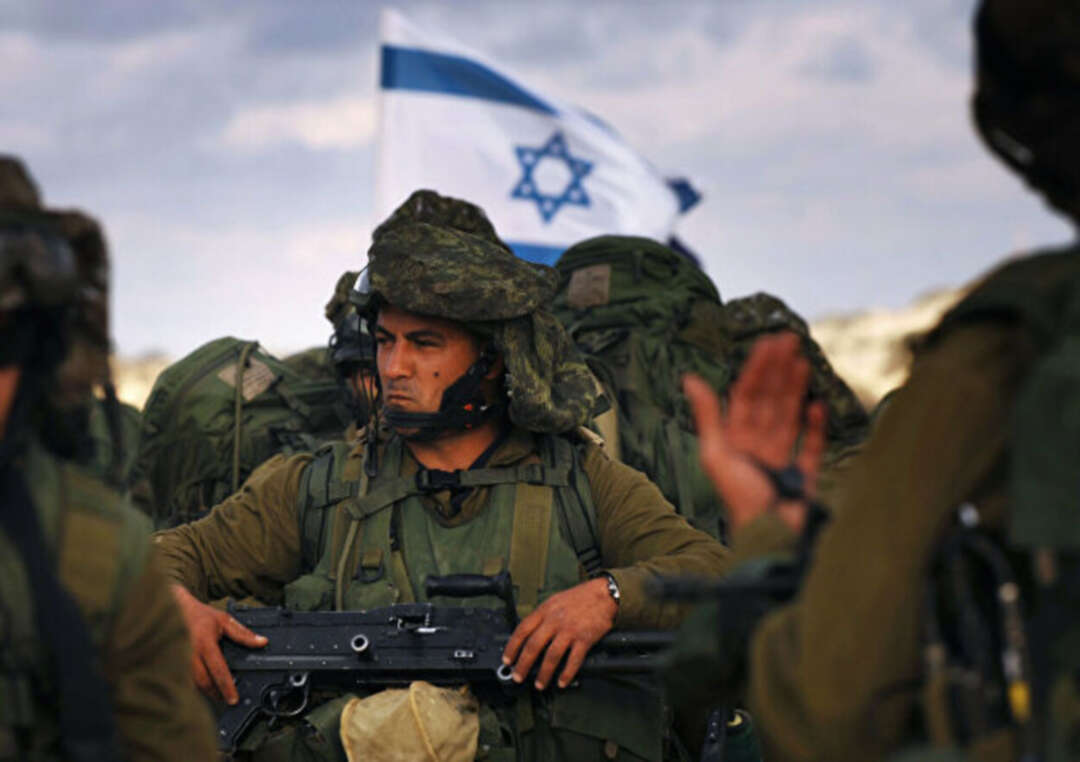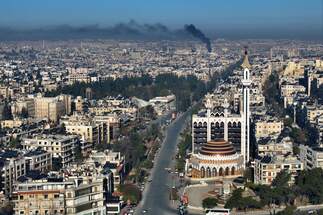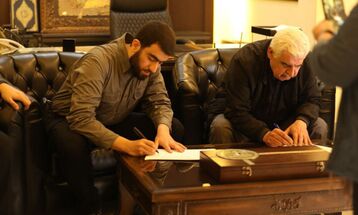-
How did Qassem Soleimani cross the "American red line"?
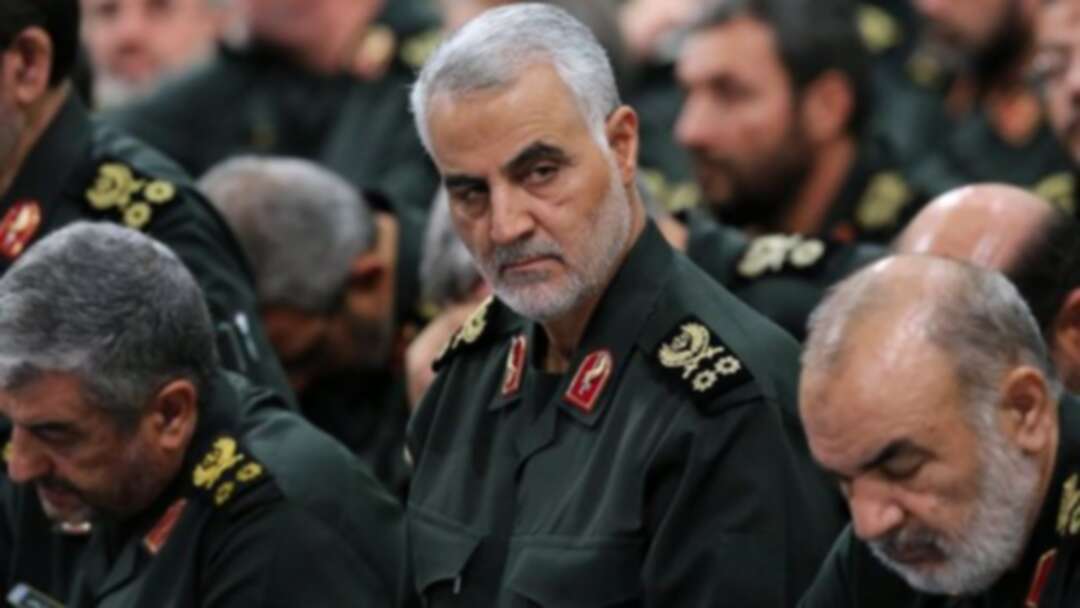
UN travel ban
Soleimani, who was killed in Baghdad, was coming from Damascus after visiting Beirut, despite the approval of his classification in the sanctions list according to Security Council Resolution 2231 that he is subject to a travel ban imposed by the United Nations. Still, all of this has no value compared to the power he made for himself until a leader within his militia in the Quds Force dared to recognize the use of civil aviation to transport soldiers after the United States and the European Union included many Iranian airlines on the sanctions list.
This came during a speech by Nusratullah Por Hosseini, one of the leaders of the Iranian Revolutionary Guards Corps forces in Syria, to the semi-official Iranian "Mehr" agency on the twenty-ninth of last October, where he said that "the Mahan company planes were helping us transfer the forces to Syria" Although Damascus airport was under bombing, he added, "Iran supports every country that has a treaty of friendship with it."
Soleimani and the Iraqi demonstrations
thousands of Iraqis took to the streets at the end of October, in the second wave of protests against the government, and what they describe as the corrupt ruling elite, as the number of deaths reached at least 250 people since the wave of the most significant unrest.
According to the Associated Press, Iran has played a pivotal role in suppressing the protests in Iraq, in which dozens of Iraqis have died, and a day after the outbreak of anti-government protests in Iraq, early last October, Iranian General Qassem Soleimani flew to Baghdad late at night. Soleimani boarded a helicopter to reach the heavily fortified Green Zone in the center of the Iraqi capital, where he surprised a group of senior security officials by chairing a meeting to replace the Prime Minister, according to The Associated Press.
Soleimani told Iraqi officials: "We in Iran know how to deal with the protests," according to two senior officials who attended the meeting, speaking on condition of anonymity because they were talking about the content of a secret meeting. Soleimani added at the time: "This happened in Iran, and we controlled it."
One billion dollars to support terrorism
It appears that Iranian interventions across the region have prompted the US State Department, in a report issued on November 1, to confirm that Iran remains the worst state sponsor of terrorism in the world by supporting several extreme groups, And the American release on terrorism in 2018 stated that the Iranian regime spent about one billion dollars to support its proxies from terrorist groups.
The report presented in Washington indicated Iran's support for terrorist groups such as Hezbollah, Hamas, and Palestinian Islamic Jihad, stressing the importance of the sanctions imposed on Iran after Washington withdrew from the nuclear agreement in May 2018, due to Tehran's persistence in its destabilizing behavior in the Middle east.
The State Department added that "despite the official efforts of the Lebanese government to distance itself from regional conflicts, Hezbollah has continued its military role in Iraq, Syria, and Yemen."
In a tweet on his official account on Twitter, US Secretary of State Mike Pompeo said on November 2 that the goal of imposing financial sanctions on Iran is to protect the world from it, highlighting that it misuses the money it reaches.
He wrote: “The United States of America welcomes the actions of the International Financial Action Task Force (FATF) to impose additional measures to protect the world from Iran.” He added: “The regime does not want the world to see how money is misused in Iran.” He pointed out that Tehran must comply with the Palermo Agreement and the Convention for the Suppression of the Financing of Terrorism.
The Iranians call for an end to interference
After the Iranian authorities on November 15 legalized the distribution of gasoline and raised its prices, mass demonstrations took place in several Iranian cities, such as Tehran, Shiraz, Isfahan, and Tabriz, to protest the increase.
Mehdi Akbai, a member of the Iranian National Resistance Council, issued a statement regarding the demonstrations in various Iranian cities after increasing the price of gasoline, in which he said that there is no solution to the misdeeds that have befallen the Iranian people, wars, and terrorism against the peoples of the region except by toppling the guardianship of the Islamic jurist.
Akbai said on the Iranian demonstrations: "This evening, the people gathered in the city of Mashhad, the second-largest Iranian city, on the highway Wakilabad and they blocked the road with their cars and chanted slogans" dictator leave power, "and" Shame on Rouhani, leave the country, "And «Death to Rouhani." They wrote banners with the slogan, "I will not buy gasoline any longer." He also commented: "These people are plundering the people's wealth and squandering it in fueling wars, exporting terrorism, and nuclear and missile projects against the interests of the Iranian people and the peoples of the region." This is what the Iranian people seem confident of. This is shown in a video clip of Iranian demonstrators, on November 16, and they chant Against the interference of the Tehran regime in the affairs of the region. The demonstrators chanted in their demonstrations the slogan "No Gaza, no Lebanon. My soul is for Iran."
Soleimani outlines the policies
On November 18, the American New York Times exposed leaked Iranian intelligence reports on Iran's plan for regional influence, confirming Iran's hegemony over Iraq. Which took root in the fall of 2014, indicating how Iran overtook the United States in Iraq by recruiting Tehran to previous CIA agents after the US withdrawal from Iraq and also recruited a US State Department official to provide it with information about Washington's plans in Iraq, adding that the former US President, Barack Obama, stipulated the overthrow of Nuri al-Maliki to renew military support for Iraq.
The newspaper's information relied on documents written by the Iranian Ministry of Intelligence and Security officers in 2014 and 2015, saying that leaked Iranian reports confirm the visit of the Quds Force Commander Qassem Soleimani, to Iraq to support Iraqi Prime Minister Adel Abdul-Mahdi. And that Soleimani determines Iran's policies in Lebanon, Syria, and Iraq, and the American newspaper mentioned the Iranian presence at Baghdad airport, and that Iranian spies at Baghdad airport monitored American soldiers and the flights of the international coalition to fight ISIS.
Noting that the Iranian ambassadors in Lebanon, Syria, and Iraq are of the highest ranks of the Revolutionary Guards, confirming that Iraqi political, security and military officials have established secret relations with Iran, noting that Iran focused on appointing high-ranking officials in Iraq and that the former Iraqi Minister of Interior, Bayan Jabr, is one of the most prominent officials close to Iran.
The documents revealed that Iran considers monitoring American activity in Iraq a necessity for its survival and national security, stressing that Iranian spies are permeated in southern Iraq, and the New York Times added in its report that Iran is keen to send its students to religious sites in Iraq. Iran is also eager to build hotels In Karbala and Najaf; the newspaper also indicated that the purges in Jurf al-Sakhr were carried out by Iranian militias.
An American expectation of an irresponsible Iranian act
The Americans sensed an imminent Iranian threat, as media reports quoting the Pentagon said on December 3 that new evidence of an Iranian threat to US forces and interests in the Middle East had been found, and media outlets for the ministry had indicated that Iran had moved Forces and weapons in a way that raises US fears of a possible attack if ordered by the Iranian regime.
Stressing that there is no evidence of an Iranian threat to US officials, while CNN cited a Trump administration official, it is "not clear whether the potential threat will come from the central government or the Iranian Revolutionary Guard."
"I expect that if we look at the past three or four months, they are likely to do something irresponsible," said US Central Command chief Gen. Kenneth McKenzie. The United States stressed that the Iranians made many provocations against commercial shipping in the Gulf earlier this year and were also responsible for a massive drone attack on Saudi Arabia's oil infrastructure. US Defense Secretary Mark Esper said several weeks ago, "The administration is pleased to see a decline in Iranian public actions in the region. The administration wanted to send a signal that the way forward is through diplomacy. Still, the military is ready to act as needed."
Confiscation of Iranian weapons
In the context of its suspicious role based on financing and arming militias, US officials confirmed on December 5 that a US Navy warship was able to confiscate sophisticated parts of missiles believed to belong to Iran from a boat in the Arabian Sea.
In a statement, the Pentagon stressed that on November 25, an American warship had found "sophisticated missile components" on an unidentified ship, and an initial investigation indicated that the parts were Iranian. A senior Pentagon official stated that there were signs of possible Iranian hostilities in the future amid escalating tensions between the Islamic Republic and the United States.
John Rood, the third-largest official in the Pentagon, told reporters, "We are still seeing indications, and I will not go into details of them for obvious reasons, on the possibility of launching Iranian aggression." He continued: "We have sent unambiguous and explicit signals to the Iranian government about the repercussions of the possible aggression," And two US officials, who asked not to be identified, mentioned the existence of intelligence information during the past month indicating that Iran is moving forces and weapons in the region.
Soleimani chooses the prime minister
Soleimani has long treated the country in which he has militias as a back garden for Iran. On that December 7, Assistant US Secretary of State for the Middle East David Schenker stated that the commander of the Iranian Revolutionary Guard Corps Qassem Soleimani “has a record of violating Iraqi sovereignty, and he is In Baghdad to choose the next Iraqi prime minister, and this is unacceptable. ”
He noted that "Soleimani violates the travel ban imposed on him by the Security Council," and pointed out that Washington does not have the powers to arrest Soleimani in Iraq, and he continued: "The Iraqi government can arrest Qasim Soleimani according to a decision of the Security Council."
He said that the sanctions imposed by the US administration on four Iraqi officials accused of killing demonstrators or corruption are "a message addressed to the Iraqi government and to Iran as well."
Schenker denied any American interference in Iraqi or Lebanese affairs, saying: "We do not interfere in the affairs of Iraq or Lebanon, nor do we decide who is the next prime minister, and we do not establish militias or terrorist organizations in Iraq. Iran is the one who does this."
Schenker warned that Washington may impose more sanctions, including against government officials, and told a press conference in Washington, "We urge the neighbors not to interfere and undermine the country's constitution," considering that the presence of Qasim Soleimani in Baghdad is unnatural and a problem and constitutes a significant violation of Iraqi sovereignty.
The Red Line and US bases
It seems that the American messages about the necessity of moving away from Iraq have been misunderstood by the Iranian side, as it resorted to taking military steps against American bases, where a senior American military official stated on the eleventh of last December that attacks by armed factions backed by Iran on bases Military hosting American forces in Iraq is increasing and becoming more complicated, which pushes all parties towards an escalation out of control.
That warning came after four Katyusha rockets landed on a base near Baghdad International Airport, wounding five members of the Iraqi counterterrorism service, the latest in a series of rocket attacks in the five weeks leading up to the statement, targeting military installations hosting US forces affiliated with the coalition aims to defeat ISIS fighters.
In an interview with Reuters, the American official revealed that the attacks endanger the ability of the coalition to fight the militants of the organization, and this comes in conjunction with the heightened tension between the United States and Iran in the region due to the US economic sanctions on Iran, while the two sides exchanged accusations regarding attacks on oil installations And weapons stores for the Popular Mobilization in addition to military bases hosting American forces, The official, who spoke on condition of anonymity, said: “We are used to the fire, but the frequency of that was accidental in the past. Now the rate of escalation is increasing, and the number of rockets fired in one barrage is increasing, which is very worrying to us.”
He added: “There is a point at which their actions will cause change on the ground and make it more likely that the actions and other choices that some make, whether they or we, will cause an unintended escalation.” The US military official noted that the Iranian-backed factions are approaching the red line, which calls for the coalition forces to respond with force, and "the result will not be liked by anyone."
Although no party has claimed responsibility for any of these attacks, the US official confirmed that intelligence and forensic analyzes, and the examination of missiles and their launchers, pointed to the responsibility of the Iranian-backed PMF, especially the “Hezbollah Brigades” and “Asa’ib Ahl al-Haq” “He explained that the Iraqi government did not take any action against these attacks, He said: "It is very worrying for me to be the target of attacks from elements that are supposed to be under the control of the Iraqi government as part of its security forces." He continued that armed factions used a modified truck to launch 17 missiles at the Qayyarah military base south of Mosul on November 8. highlighting that the attack did not cause casualties or heavy losses, but this method was followed in attacks on Balad and Ain al-Asad air bases last week using missiles large enough to cause severe damage to the housing complexes and runways in Ain al-Assad.
American warning
As a result of Iran's approaching the American Red Line, US Secretary of State Mike Pompeo issued a warning to Iran on December 13 of a decisive response if his country's interests were harmed in Iraq after a series of missile attacks on military bases, "We must seize this opportunity to remind Iran's leaders that any attacks, by them or their representatives, of any kind that harm the Americans, our allies, or our interests, will be answered decisively," he said in a statement. Noting that "Iran's agents recently carried out several attacks on military bases sheltering Iraqi security forces and crews from the United States and the international coalition," adding: "Iran must respect the sovereignty of its neighbors and immediately stop supporting third parties in Iraq and the region."
American calls to respond
As Iran continues to support and incite its militants in Iraq to launch attacks against American forces and bases, and American Senator Tom Cotton of the Republican Party on December 28 called for a decisive response to the attack by the American base in Kirkuk, which killed an American contractor and wounded American soldiers, He tweeted: “If the American blood was spilled by a group backed by Iran, then Tehran must face dire and dangerous consequences,” in conjunction with what the US-led international coalition against ISIS announced, on the evening of December 27, On the death of an American and the injury of several soldiers in a missile attack targeting a military base in Kirkuk in northern Iraq, where American military sources accused the Iraqi militias of Iran of being behind the attack.
American mobilization
With the escalation of the confrontation between the two parties, the Secretary of Defense and Foreign Affairs headed to Florida on December 30, where President Donald Trump is present, to brief him on the latest developments and American airstrikes on sites said to be belonging to Iran in Iraq, "We came to inform the president about the events that took place during the past 72 hours, we will not let Iran take actions that endanger American men and women," Secretary of State Mike Pompeo told a press conference alongside Defense Secretary Mark Esper in the Mar-a-Lago resort in Florida. Pompeo added that he would leave room for Minister Esper to talk about the military aspects. Still, he wanted to clarify US policy regarding Iran.
Esper said, “The Pentagon targeted five sites in Iraq and Syria in response to the attack by an Iranian-backed militia on an Iraqi facility that would endanger American forces.” Esper continued that the strikes were successful, and the pilots and planes returned to the base safely. I want to add that during our meeting today with the President, we discussed the other options available, and I would also point out that we will take the additional measures that we deem necessary. We confirm that our behavior was in self-defense and to deter more bad behavior by the militias or from Iran”.
strikes against Iranian agents
The American decision came to decisively confront Iran's arms when it approached the Americans themselves, as the media in Iraq reported on December 30, that 66 people were killed in American raids on the bases of the Iraqi Hezbollah, including 41 Iranians and 25 members of PMF, Where the Pentagon announced that American planes launched attacks on the headquarters of the Iraqi Hezbollah militia, which resulted in the death and injury of fighters, including the militia leader, Abu Ali Khazali, considering that these raids constitute an initial response.
According to an American military source, American F-15 fighters targeted five bases belonging to the Iraqi Hezbollah militia: 3 in Anbar and 2 in Syria, and Pentagon spokesman Jonathan Hoffman said in a statement that these strikes were carried out "in response to repeated attacks by Iraqi Hezbollah brigades on Iraqi bases that include American forces. Stressing that "it will weaken the capabilities of the Hezbollah Brigades to launch future attacks on coalition forces," and a statement by the US Army stated that the five installations targeted by the Iraqi Hezbollah include weapons stores and command and control sites.
America blames Iraq
The American response to the Iranian provocations in Iraq was not limited to the strikes on its proxies. Still, on December 30, Washington also accused the Iraqi authorities of not making the necessary efforts to "protect" the interests of the United States, and a senior State Department official told reporters in Washington: "The Iraqi government has repeatedly warned us, and we have shared information with them to try to work together to fulfill its responsibility to protect us as guests."
The official noted that the US military and American diplomats are present in Iraq "at the invitation of the Iraqi government," and stressed that "it is its responsibility and duty to protect us, and it has not taken appropriate steps to do so," while US Secretary of State Mike Pompeo tweeted on his Twitter account: "I spoke today, with United Nations Secretary-General Antonio Guterres following the American response to the recent attacks in Iraq, I made it clear that our defense work was aimed at deterring Iran and protecting the lives of Americans.
America decides the end of Soleimani.
And after all that give and take between the American side on the one hand and the Iranian on the other hand, and the Iraqi authorities' inability to carry out their duties according to the American perspective of the issue, Iraqi state television announced, at the dawn of December 3, the killing of the Iranian General Qassem Soleimani, commander of the Quds Force of the Revolutionary Guards, In addition to the murder of Deputy Leader of the Popular Mobilization Militia, "Abu Mahdi Al-Muhandis," in an American bombing, American officials told Reuters that Washington had carried out strikes against two targets linked to Iran in Baghdad.
This event announced the end of Soleimani, who terrorized many during the past years, after the spread of the ISIS terrorist organization and the success of Iranian arms in extending their influence over large areas of several Arab countries that are still suffering from the fire of sectarianism and sectarian fragmentation.
By : AHMED MOHAMMED
You May Also Like
Popular Posts
Caricature
BENEFIT AGM approves 10%...
- March 27, 2025
BENEFIT, the Kingdom’s innovator and leading company in Fintech and electronic financial transactions service, held its Annual General Meeting (AGM) at the company’s headquarters in the Seef District.
During the meeting, shareholders approved all items listed on the agenda, including the ratification of the minutes of the previous AGM held on 26 March 2024. The session reviewed and approved the Board’s Annual Report on the company’s activities and financial performance for the fiscal year ended 31 December 2024, and the shareholders expressed their satisfaction with the company’s operational and financial results during the reporting period.
The meeting also reviewed the Independent External Auditor’s Report on the company’s consolidated financial statements for the year ended 31 December 2024. Subsequently, the shareholders approved the audited financial statements for the fiscal year. Based on the Board’s recommendation, the shareholders approved the distribution of a cash dividend equivalent to 10% of the paid-up share capital.
Furthermore, the shareholders endorsed the allocation of a total amount of BD 172,500 as remuneration to the members of the Board for the year ended 31 December 2024, subject to prior clearance by related authorities.
The extension of the current composition of the Board was approved, which includes ten members and one CBB observer, for a further six-month term, expiring in September 2025, pending no objection from the CBB.
The meeting reviewed and approved the Corporate Governance Report for 2024, which affirmed the company’s full compliance with the corporate governance directives issued by the CBB and other applicable regulatory frameworks. The AGM absolved the Board Members of liability for any of their actions during the year ending on 31st December 2024, in accordance with the Commercial Companies Law.
In alignment with regulatory requirements, the session approved the reappointment of Ernst & Young (EY) as the company’s External Auditors for the fiscal year 2025, covering both the parent company and its subsidiaries—Sinnad and Bahrain FinTech Bay. The Board was authorised to determine the external auditors’ professional fees, subject to approval from the CBB, and the meeting concluded with a discussion of any additional issues as per Article (207) of the Commercial Companies Law.
Speaking on the company’s performance, Mr. Mohamed Al Bastaki, Chairman BENEFIT , stated: “In terms of the financial results for 2024, I am pleased to say that the year gone by has also been proved to be a success in delivering tangible results. Growth rate for 2024 was 19 per cent. Revenue for the year was BD 17 M (US$ 45.3 Million) and net profit was 2 Million ($ 5.3 Million).
Mr. Al Bastaki also announced that the Board had formally adopted a new three-year strategic roadmap to commence in 2025. The strategy encompasses a phased international expansion, optimisation of internal operations, enhanced revenue diversification, long-term sustainability initiatives, and the advancement of innovation and digital transformation initiatives across all service lines.
“I extend my sincere appreciation to the CBB for its continued support of BENEFIT and its pivotal role in fostering a stable and progressive regulatory environment for the Kingdom’s banking and financial sector—an environment that has significantly reinforced Bahrain’s standing as a leading financial hub in the region,” said Mr. Al Bastaki. “I would also like to thank our partner banks and valued customers for their trust, and our shareholders for their ongoing encouragement. The achievements of 2024 set a strong precedent, and I am confident they will serve as a foundation for yet another successful and impactful year ahead.”
Chief Executive of BENEFIT; Mr. Abdulwahed AlJanahi commented, “The year 2024 represented another pivotal chapter in BENEFIT ’s evolution. We achieved substantial progress in advancing our digital strategy across multiple sectors, while reinforcing our long-term commitment to the development of Bahrain’s financial services and payments landscape. Throughout the year, we remained firmly aligned with our objective of delivering measurable value to our shareholders, strategic partners, and customers. At the same time, we continued to play an active role in enabling Bahrain’s digital economy by introducing innovative solutions and service enhancements that directly address market needs and future opportunities.”
Mr. AlJanahi affirmed that BENEFIT has successfully developed a robust and well-integrated payment network that connects individuals and businesses across Bahrain, accelerating the adoption of emerging technologies in the banking and financial services sector and reinforcing Bahrain’s position as a growing fintech hub, and added, “Our achievements of the past year reflect a long-term vision to establish a resilient electronic payment infrastructure that supports the Kingdom’s digital economy. Key developments in 2024 included the implementation of central authentication for open banking via BENEFIT Pay”
Mr. AlJanahi concluded by thanking the Board for its strategic direction, the company’s staff for their continued dedication, and the Central Bank of Bahrain, member banks, and shareholders for their valuable partnership and confidence in the company’s long-term vision.
opinion
Report
ads
Newsletter
Subscribe to our mailing list to get the new updates!

